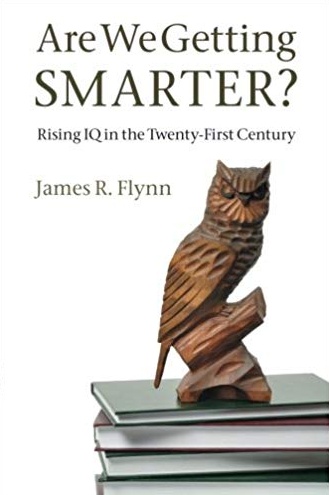Are We Getting Smarter: Thoughts on the Flynn Effect

Seven years ago, I wrote the following book review for the Wall St. Journal. I posted highlights with commentary before, but here's the whole thing.
Review: Are We Getting Smarter? Rising IQ in the Twenty-First Century by James R. Flynn.
James R. Flynn, one of the most influential figures in modern psychology, is not a psychologist. He’s a trained political philosopher. He broke into psychology in his fifties by painstakingly documenting the now-famous “Flynn effect” – the strong tendency of measured intelligence (“IQ” or “g”) to rise over time. Psychologists quickly embraced him as one of their own – but the courts, to Flynn’s frustration, often disqualify him as an expert due to his missing credentials. Are We Getting Smarter? interweaves Flynn’s expertise in psychology, political philosophy, and even sociology to shed new light on a wide range of questions.
When most people hear about the Flynn effect, they eagerly conclude that we really are getting smarter. Flynn is more cautious. He opens the book by reviewing his previous work on intelligence subtests. IQs have risen, but we’re definitely not smarter across the board. We’re better with puzzles and similarities, but no better at arithmetic. Vocabulary and general information have risen for adults, but barely budged for children.
If you still want to say that people are “smarter” than they used be, Flynn does not object, but “it would probably be better to say that we are more modern.” Modern humans see the world through what Flynn calls “scientific spectacles.” We are comfortable with abstract classification, logic, and hypotheticals – including (Flynn suspects) moral hypotheticals.
Flynn then moves on to a grab-bag of IQ-related topics. Are less-developed countries experiencing a Flynn effect? Usually. IQ is rising very rapidly in Kenya and fairly rapidly in Saudi Arabia, but slowly in Sudan and Brazil. What does the Flynn effect imply for the death penalty? Courts call the execution of the mentally retarded “cruel and unusual,” but how should we measure retardation? Flynn argues that a killer with an IQ of 80 by the standards of 1960 could easily be mentally retarded by the standards of today.
The most gripping section of Are We Getting Smarter? is probably his chapter on aging. What becomes of low- and high-IQ adults when they’re old? The answer is complex. Verbal intelligence peaks in middle age, then slowly declines. But there is a substantial “bright bonus”: people with high IQs decline far less than people with low IQs. If you’re in the top percentiles of the population, your verbal intelligence will be about as good in the eighties as it was in your teens. For analytical intelligence, however, there is a massive “bright tax.” People peak in their teens, then decline. The higher their initial IQ, the greater the atrophy. The most analytically powerful teens end up being the most analytically powerful retirees; but even the brightest eventually become mediocre. If you want to prolong your cognitive powers, Flynn hypothesizes a simple remedy: don’t retire.
If less analytic exercise after retirement is the cause of the bright tax, and if you resent the relative decay of those abilities… the remedy is clear. Keep doing research, keep teaching complex material, play more chess, keep up with developments in mathematics, and so forth.
The highlights of Are We Getting Smarter are well worth the price of admission. Yet the quality is uneven. Flynn’s analyses of IQ subtests and mental aging are meticulous. But his Big Picture is under-argued at best. Flynn is confident that rising IQs reflect our greater use of “scientific spectacles.” Yet the General Social Survey and other studies of scientific knowledge show that most American adults are scientifically illiterate. On true-false tests, they correctly answer 60% of basic questions – barely better than chance. Their grasp of scientific method is similarly dismal. How can science explain rising IQ if we know virtually no science?
Some sections – most notably Flynn’s attack on the death penalty – are also tainted by serious left-wing bias. He is eager to argue that the “competent” murderers of 1960 were “mentally retarded” by modern standards. However, you just as easily conclude that the “mentally retarded” murderers of today are “competent” by the standards of 1960. Flynn briefly considers this argument, and objects that “practical intelligence,” unlike IQ, has not risen. If so, why not forget the Flynn effect and use unadjusted IQ scores as a proxy for practical intelligence?
Flynn ends his book by urging psychologists to become more philosophical and more sociological. We can learn more about the human mind from IQ tests than brain science: Defining “intelligence in terms of events in the brain and nervous systems… is no more sensible than defining extroversion in terms of physiological events.” He ridicules the idea that modern societies are turning into hereditary aristocracies: “A class-stratified meritocracy requires something improbable: a population both money drunk and justice drunk.” He argues that black single motherhood is a reasonable response to scarcity of marriageable men: “Their President advises them ‘not to lie down with any fool,’ as if there were enough non-fools to go around.”
Few readers will agree with more than half of Flynn’s closing observations. All of them, however, are food for thought. If Flynn’s explanation for rising IQ is right, he isn’t merely explaining mankind’s mental evolution. Reading – and critically evaluating – Flynn actually makes us smarter. Or at least more modern.
The post Are We Getting Smarter: Thoughts on the Flynn Effect appeared first on Econlib.
作者暂无likerid, 赞赏暂由本网站代持,当作者有likerid后会全部转账给作者(我们会尽力而为)。Tips: Until now, everytime you want to store your article, we will help you store it in Filecoin network. In the future, you can store it in Filecoin network using your own filecoin.
Support author:
Author's Filecoin address:
Or you can use Likecoin to support author: